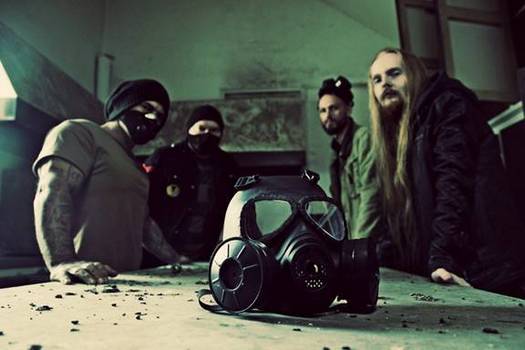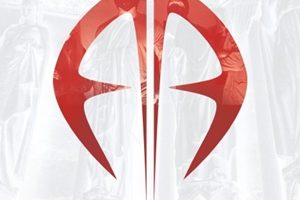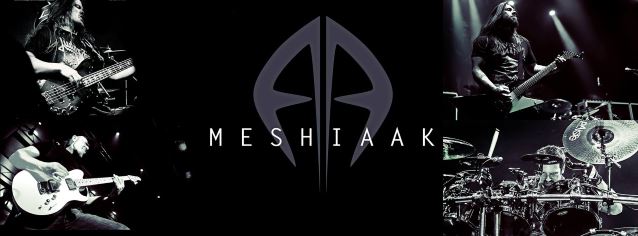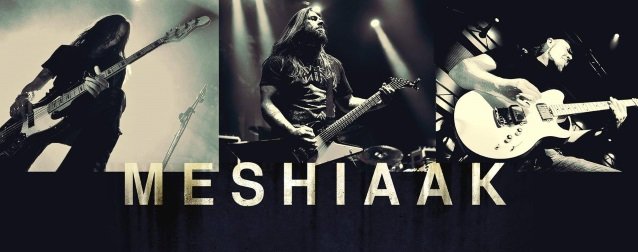Meshiaak – Misery with a Twist
Sunday, 29th December 2019
Quality should rise to the top in any genre – especially heavy metal. Australian band Meshiaak in their short existence have made a solid impression, wishing to push the parameters of their heavy brand of music beyond specific categories and develop a fanbase that just appreciates solid mechanics – hooks, melodies, riffs, grooves, and harmonies on a song by song basis. Their latest album Mask of All Misery does just that and more – moving beyond the thrash tag that their debut record Alliance of Thieves may have pushed, delivering emotional material that can be heavy at all paces, incorporating keyboard and acoustic guitar elements when called for.
We reached out to guitarist Dean Wells by Skype and had a solid discussion of the man’s roots, the development of Meshiaak, thoughts on the Australian metal scene, his outlook as a songwriter/producer, and some frank discussion about his worries and concerns for the world that we live in today.
Dead Rhetoric: What are your earliest memories surrounding music growing up – and how did you eventually gravitate towards heavy metal plus picking up an instrument to perform and play yourself?
Dean Wells: My dad and mom were really good singers, and both in a band before I was born. My dad, he did fairly well with singing on television here. There was always music around the family. My dad was a guitarist too, but I didn’t pick up an instrument until I was about 15. I played a lot of sports, and I thought that was what I was going to do (for a living), and then I broke my leg. So I was bored for six months, so I started playing guitar then. My dad was more into The Beatles and that sort of stuff, and I liked Metallica and Megadeth. That was pretty much the first stuff I started to learn, and Guns ‘n’ Roses as well. I was always around the music, so it made it kind of easy to fall into it.
It’s always been really natural for me to pick things up by ear. My dad showed me four chords and at that time, my parents separated so I sort of taught myself. I’m self-taught ever since – I’ve never actually had a guitar lesson.
Dead Rhetoric: Meshiaak formed in 2014 with Danny Camilleri of 4Arm and yourself, along with bassist Andrew Cameron and journeyman drummer Jon Dette. What do you remember about the early days and did you have a sense of focus and direction with where you wanted to take this band musically compared to your past work?
Wells: Because I’m a producer, that’s what I do for a job, I was working with Danny’s other band at the time, 4Arm. I always had my band Teramaze which is more progressive sort of stuff. We got along, and I knew he was leaving 4Arm. I thought about us doing something together for a bit of fun. I’ve never done another band other than my own- I’ve produced other bands, but not develop another band. We got together and we wanted to do something like the kind of music we grew up listening to – Metallica, Megadeth, Pantera, Annihilator, all that sort of stuff – but try to give it a new spin and a bit fresher instead of ripping those bands off, try to give it a different style. That was the idea of Alliance of Thieves, we shared ideas. It was a bit of fun at the start, we got attention from it – when we were looking at drummers to play on the album, we were talking to both Paul Bostaph and Jon Dette at the time. Jon ended up doing it – he was a session player and he ended up wanting to join the band. It got very serious quite quick. I wanted to do something different than Teramaze, and Danny wanted to do something a bit (broader) than what he was doing with 4Arm. There’s a lot more melodic stuff in Meshiaak. The label who signed Teramaze had the idea to sign Meshiaak, and this is a real thing now.
Dead Rhetoric: Mask of All Misery is the band’s second album – where do you see the major differences between this record and your debut, as it seems like a few steps forward from Alliance of Thieves?
Wells: Yeah. Alliance of Thieves was more about let’s just see what we can do together. Working with another person’s riffs, it was a cool job. This album we are very focused on spreading our wings a bit and not being just thought as a thrash band, but a metal band playing whatever we want. The difference with this album had a lot more to do with the riffs and the song structures – melodies. I had a lot of material this time around and Danny had a lot of lyrical ideas. It was a little bit different shifting of roles. I helped put the songs together in a producing and editing sort of way – I wanted to see what else we could do, things like “Doves” the ballad, “Bury the Bodies” – I wanted to push Danny to sing more melodic, because that’s what I love. We had an idea pretty early on that let’s just try to do any style we like as listeners, we were going to throw on this album. And I think that’s what we did.
Dead Rhetoric: When it comes to the songwriting, how critical are you as musicians to get the material to the right point of strong hooks, melodies, harmonies, while also being satisfied as musicians with the diversity of tempos and dynamics you convey on record?
Wells: I would say that’s more of my forte – really being crucial with editing the parts of the songs and making sure the dynamics make sense. And the vibe. It’s absolutely for my role, my priority to have the songs make sense, and be exciting at the same time. Have the same feel as what the lyrics are trying to convey as well. This album is very much more, a lot of pre-production was done with vocals, drums, etc. for every song. We knew exactly what we were doing when we started recording the album. That to me is the main part of songwriting – to be critical of your own material and deleting stuff that is just not hitting us.
Danny and I basically, once we agree on something, that is Meshiaak. I can get off on a tangent sometimes and be a bit too progressive or technical sometimes, and he’ll rope me in to keep things solid and more metal-based. Some of the progressive stuff obviously gets in there.
Dead Rhetoric: How important do you believe the embellishment of keyboards, orchestration, and extra narrative/background elements become when developing this material – and is it something you become aware of when performing these songs in front of live audiences?
Wells: It’s only a couple of songs that have a bit of strings in them. That’s really a production thing, and I produced the album. There are no rules really on what we do. The only rule is that we are going to try to write the best songs that we can. So sometimes there needs to be a bit of a string-section, or an acoustic guitar, or more backing vocals which I can do live anyway. We’ve jammed most of these songs as a band anyway. The only song I would say we may need some strings live on a backing track would be for “Bury the Bodies” – but I think it might be okay without it. I’ll try to alter my guitar parts to mirror certain things – like for “At the Edge of the World” on the last album, I play more of the string arrangement on the guitar, just because that melody is quite strong in the chorus. Most of the songs don’t have many keyboards at all – only in the choruses maybe a couple of string sections. Which is sort of standard for this style of band.
Dead Rhetoric: Can you tell us about the video shoot for “Bury the Bodies” – and was that the obvious video single to launch the album?
Wells: We fought a little bit with the label on what we wanted to do. Danny and I were strong about “Bury the Bodies”, we felt that song was different from what we did on the last album but very much represented where we are at, and vocally it’s a lot stronger. Coming up with the idea of the single focus on Danny and the blood spilling, it was supposed to be symbolic towards the song. We filmed it ourselves, and I’ve done a little bit of filming before. We were trying to capture the feeling of the song, what it means to us anyways. That was Danny’s idea, to have the slow sort of blood spilling. We could have done any song, but that song – we didn’t want to come out with a predictable, fast song. As much as many people would have wanted that, we do what we want to do, pretty much. We have to be happy with what’s going on, before we can release something to the public. Because if we are not, we are fooling ourselves. It had more of a movie vibe, rather than “City of Ghosts” which is a more straightforward metal song.
Dead Rhetoric: You also run your own recording studio and company called Wells Productions – where you also offer lessons in production beyond mixing and recording bands. How do you feel about the state of recording today, and what do you think musicians fail to take into consideration that are first steps they should consider to elevating their final product?
Wells: Wow. As a producer, I’m more so a producer than a mixer. Working with artists, an area that people may be lacking these days is musicians are so fast to want to get material out, and it’s not really sticking. To me it’s about the hooky riff and making each song stand up on its own, instead of having an album with one song that is great and the rest are nowhere near as good as that one song. As a producer, I’m always trying to push whomever I’m working with to make every song as important as the last. Sometimes you can’t control what people like, but you can control the quality you release. I’d rather have ten songs that can stand up on their own rather than twenty that… only two of them are really good. I’d delete the rest and start all over again. I bring that into both my bands, I’m always self-producing and sit back as a listener instead of a musician and feel the song. Instead of playing it so much, once it’s recorded sit back and see if its impacting. If it’s not impacting you as a writer, I don’t think you are doing your job. That’s where a producer can come in and see how far they can take this song. Working with different artists and pushing them to any level to get the most out of themselves – it needs to have depth and substance.
A lot of the recordings these days, not many bands have budgets, so a lot of the recordings are done by the bands themselves. Sometimes the end product doesn’t bring the most out of the songs. That’s what I’m trying to do as a mixer, producer, and a songwriter. I offer a fifth opinion. I’m finding it hard myself to find music that I absolutely love for new stuff. I try to listen to different styles, as I’ll listen to anything- a good song is a good song, regardless of the style. That’s why I don’t like being called just a thrash band – I feel we are a metal band, it’s really got no rules on how we want to do things. It’s a better place to be than boxing yourself in as a songwriter. That’s very limiting, and I don’t know why the music industry sort of runs itself like that. Who made these rules up? It’s art – putting out the best art you can has to be the number one goal.
Dead Rhetoric: I definitely agree. My problem as a journalist is music has moved into so many sub-categories, it ends up boxing musicians in, to the point where sometimes they feel like it stifles their creativity…
Wells: Absolutely. I’d rather just be called heavy music, you know what I mean? Putting the song “Doves” on this album. I wrote a song, it was a different ballad, just a slow song on an acoustic guitar one day when my daughter left home. I was feeling a bit depressed, so I wrote a ballad and I showed Danny. He’s like, ‘can you write something like that for Meshiaak?’. Maybe with this sort of vibe, I threw some chords down, put a melody on it and showed him. He wanted to do something like this. There are no rules with us on what we want to do- and we are going to try to keep it that way as much as possible. It’s like every band – we are the ones doing all the work, we have to be happy with what we are doing. We are not a cover band or playing everyone else’s music. With Meshiaak, the first album was a bit thrashy – but give us a chance and you’ll hear that we are a band that sometimes plays really heavy, and sometimes plays slow and melodic. We are writing music that we want to listen to – and that’s a small tip. If you want to hear something, just write it – instead of trying to be something else. It could be dance beats with heavy guitar. Only your opinion really counts when it comes to art, I think.
Pages: 1 2

























